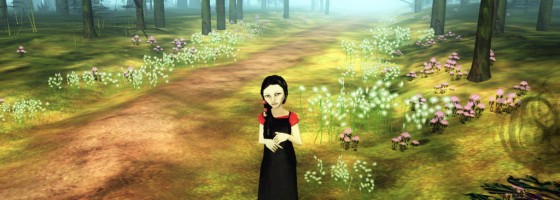Trending
Opinion: How will Project 2025 impact game developers?
The Heritage Foundation's manifesto for the possible next administration could do great harm to many, including large portions of the game development community.

Featured Blog | This community-written post highlights the best of what the game industry has to offer. Read more like it on the Game Developer Blogs or learn how to Submit Your Own Blog Post
Defining a video game has always been a touchy subject, and the rise of games focusing on storytelling first has only made it more complicated. Leading me to ask: Can you define a video game?

Defining a video game has always been a touchy subject, and the rise of games focusing on storytelling first has only made it more complicated. Leading me to ask: Can you define a video game?
Reprinted from my site: Game-Wisdom
Recently, I played two very different adventure games: To The Moon and The Walking Dead episode 5. Both titles are completely different from each other in terms of story and design except for one area. They are both built around the player being an observer with limited game play; another commonly used name for these types of titles is "art games."
While I enjoyed both titles for the stories they represent, however I feel torn as someone who studies game design. Classifying both titles as "games", they would be rip apart in any examination that focuses on gameplay. And because of that, for today's post I'm going to take the role of the contrarian and ask: should interactive stories be called games?

The Path, originally posted on Tale-of-Tales.com
For this post I'm going to avoid any plot related spoilers about either game. But I will be talking about examples of gameplay for each. The only plot points I will mention are the basic ones that are mention in the game's description.
Both the gameplay of To The Moon and The Walking Dead are about the basic mechanic of adventure titles: hunting for interactive areas. In To The Moon, the player controls a duo of doctors whose job is to enter the mind of terminally ill patients and alter their memories to fulfill their last request.
The gameplay involves walking around each memory looking for memory links that can be used to access the next earlier memory. There is basic puzzle solving in the form of figuring out how to unscramble a picture and two special segments that I won't talk about for spoiler reasons.
In The Walking Dead, the player's time is mainly spent deciding what dialogue options to pick from which in turn affect the story in subtle ways. There are puzzles here and there requiring the player to look around in the general area for items needed to progress. QTEs are mainly used for combat sections and dangerous situations.
And that's it, neither title is very long and it's very hard to get hopelessly stuck at either. Now, if I were to walk up to you on the street and tell you about either game using the gameplay descriptions, how many of you would actually play these games, or even classify them as a game?
One of the definitions of a game according to Encarta that fits with a video game is: An activity that resembles a game, e.g. one that involves intense interest and competitiveness and is carried out by its own specific and often unspoken rules.
Building off of that, video games are also defined by a series of rules and game systems. Most importantly, one of the basic elements of a game is that there has to be a win and a lost state.

To The Moon, originally posted on IGN.com
To The Moon uses a retro look and feel to help tell a deep story-line. Even without voices the game delves and talks about mature content.In both The Walking Dead and To The Moon, there are no real lost states. With the former, death simply resets the game to before the QTE allowing the player to try again infinitely.
And in the latter, there is never a point where the player is in any danger of failure.
Now these two games aren't the only ones who don't have this condition. Titles that are considered "art games", such as The Path from Tale of Tales also don't satisfy the win/lose state of a game.
These types of games share one major element: the player is an observer to the events. Instead of directly influencing the outcome of the game, they are mainly taken on a ride in favor of telling a story. Unlike a game like Amnesia where even though the player can't fail the game, they are still tested by puzzle and stealth sections.
“The word [game] is used for so many different activities that it is not worth insisting on any proposed definition. All in all, it is a slippery lexicological customer, with many friends and relations in a variety of fields."
- David Parlett, The Oxford History of Board Games.
One of the reasons why titles where the mechanics are downplayed and scrutinized is that these types of games are fairly new to the industry. The industry was built on games about action and gameplay, both due to wanting to attract people to play and due to the limitations of the hardware.
The idea of playing what could be considered a “virtual sightseeing tour" doesn't still well with a lot of gamers.
With all that said, I would not classify either title as a game using the basic definition. But when we talk about games, there is more to judge a game than just the gameplay. And there are as plenty of different types of games as there are movie genres and books.
While To The Moon and The Walking Dead may not deliver on amazing gameplay, they both feature great story lines. And I will admit that that there are only three times where I cried playing a video game, and these two games are #2 and 3 on that list.

Journey, originally posted from ThatGameCompany.com
Journey's unique visual and sound design helped to create an experience beyond just the general gameplay of exploring the world.Are we doing these titles a disservice by calling them games? Or is it more of a disservice to label them "interactive stories?" I don't completely know the answer, and looking around online, there isn't a straight answer.
It is very difficult to find a conclusive definition of a game, much less a video game. According to Merriam Webster- a video game is an electronic game played by means of images on a video screen and often emphasizing fast action, and a game is: an activity engaged in for diversion or amusement. Neither of which actually assist us with a true definition of a game.
If push came to shove, I would define a video game as: software designed to let a user experience a unique scenario with its own set of governing rules and systems, and to experience meaningful game design. But I don't know how well that would be received by people. Some even argue that we shouldn't even begin to define a game.
But if we were to define game design, that becomes easier. In the book, Rules of Play: Game Design Fundamentals by Katie Salen and Eric Zimmerman, they offered the following basic definition:
“Design is the process by which a designer creates a context to be encountered by a participant from which meaning emerges."
If we extended this to art games or interactive stories, these titles don't have any meaningful gameplay, but do elicit meaning in the stories they are trying to tell. What makes a good game designer is not just thinking about how the gameplay would work, but how the game would look, sound, and play as well.
As there are more elements to a video game then just playing it, but are these significant enough to label something a video game?
What do you think? Is defining what is or is not a game a fool's errand? And is there any meaning in a title where the player's interaction has none?
Read more about:
Featured BlogsYou May Also Like